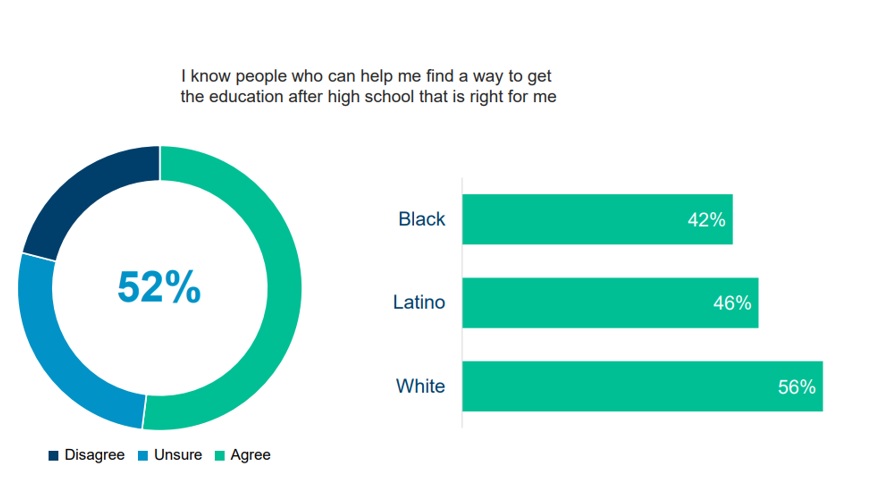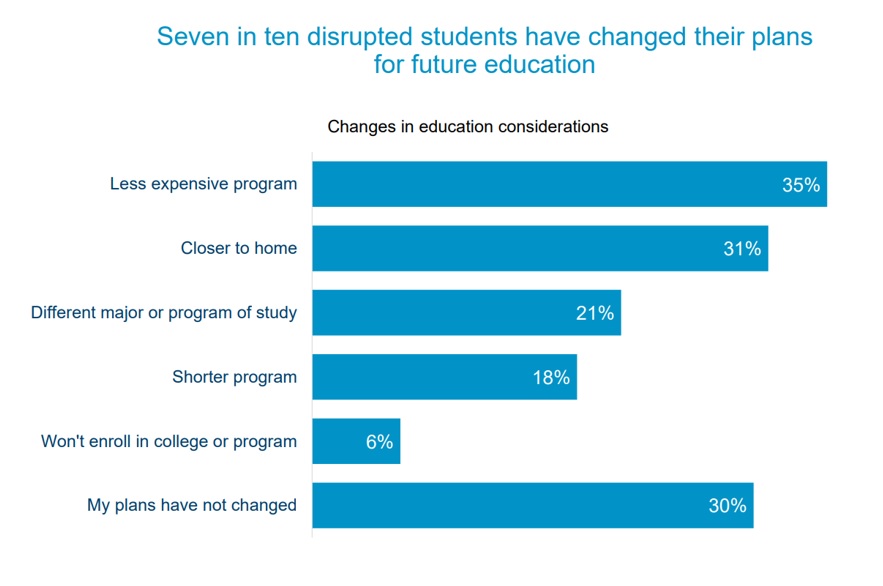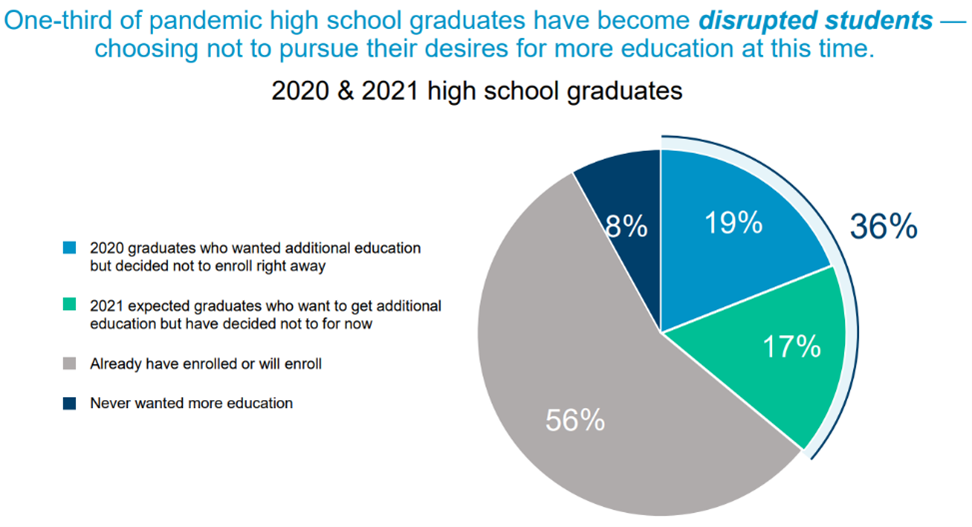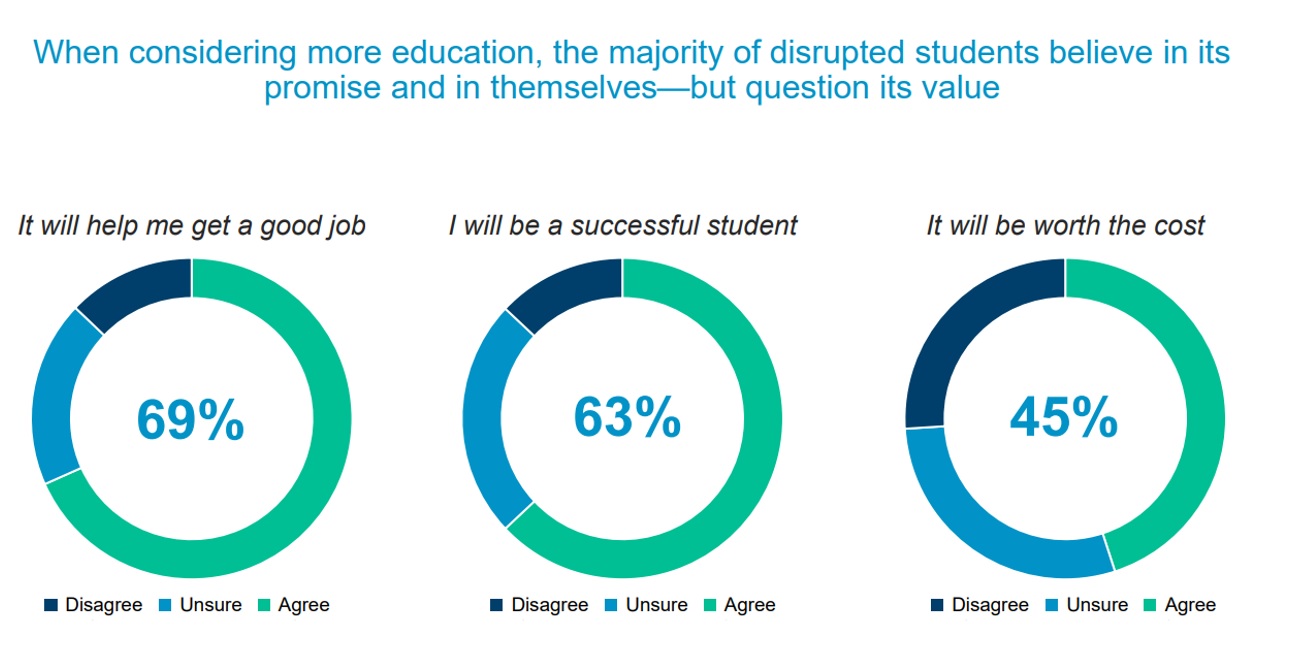On June 10, the National Student Clearinghouse Research Center released its final spring enrollment numbers, and although the findings weren’t surprising, they were severe. Spring enrollment is down compared to last year; across traditional college age students, enrollment declined 5%, and at community colleges, enrollment is down 13.2%. In Florida, things are not as severe, as overall enrollment is only down about 1%. But for community colleges, Florida saw a double digit decrease in enrollment (10.4%).
Where are these students going, and how can the college access movement better serve these students who have disconnected from postsecondary education? To better understand COVID-related disruptions, Strada Education Network surveyed over 1,000 high school graduates from the classes of 2020 and 2021 who intended to enroll in education after high school, but changed plans. In short, these students said they need better guidance, affordable pathways, and stronger connections from education to career in order to reconnect with their educational goals.
Guidance
 When asked why students decided to not enroll in education after high school, the two biggest answers were “stress or anxiety,” and “financial pressure or affordability.” Having more guidance could help tackle both barriers. In fact, students ranked an advisor as the most helpful support they could have when trying to get more education, and this is particularly salient for first-generation students who may not have an adult at home who has been through the college-going process before. Guidance from an advisor could help students understand what financial aid they qualify for and serve as a reliable mentor when students feel overwhelmed by the process of further education.
When asked why students decided to not enroll in education after high school, the two biggest answers were “stress or anxiety,” and “financial pressure or affordability.” Having more guidance could help tackle both barriers. In fact, students ranked an advisor as the most helpful support they could have when trying to get more education, and this is particularly salient for first-generation students who may not have an adult at home who has been through the college-going process before. Guidance from an advisor could help students understand what financial aid they qualify for and serve as a reliable mentor when students feel overwhelmed by the process of further education.
Strikingly, only half of students agreed that they know someone who can help them find a way to get education after high school that is right for them. Students need a responsive, supportive, and reliable adult with information who can help them see clear, possible pathways ahead of them and answer questions that seem small, but become barriers when students do not have anyone to help.
Affordability
The second biggest self-identified barrier to future education for students is affordability or financial pressure. Among students still interested in enrolling in education after high school in the future, over 1 in 3 said they would choose a less expensive program. Black and Latinx students were more likely to change their plans for this reason compared to their White peers.
 Money is a principal issue for students, many of whom contribute to their family’s finances. Students shared they don’t know how they could pay for education, and they want to avoid loans. Disrupted Latinx students are more likely than their Black and White peers to feel financial pressure, which has great implications for Florida, where Latinx students represent over a third of the Class of 2021.
Money is a principal issue for students, many of whom contribute to their family’s finances. Students shared they don’t know how they could pay for education, and they want to avoid loans. Disrupted Latinx students are more likely than their Black and White peers to feel financial pressure, which has great implications for Florida, where Latinx students represent over a third of the Class of 2021.
Connection to Career
Most students surveyed shared that they believe education can help get them a good job. However, students are less sure that education is worth the cost, showing that there is a disconnect between education pathways and outcomes. This suggests those interested in advancing educational attainment need to consider how we are communicating clear connections from education to career. The Florida educational landscape strongly emphasizes the alignment between specific education programs and in-demand, high-wage jobs, but somewhere along the way, students may be struggling to make connections themselves.
Amidst this sea of disconnected students, there are encouraging signs. About 2 in 3 disconnected students say they are very likely to continue their education in the future, suggesting that thoughtful outreach and action could help bring these students back. There is a lot of promising work happening in Florida to expand postsecondary access, but insight from this Strada survey can help guide next steps. And those working on the important time between high school and college know that, however seamless transitions can seem, we need to continue to listen to young people to understand what this process feels like and what unseen obstacles can result in stopping out.
Postsecondary advocates across the state have joined FCAN in the Cash for College campaign to ensure the classes for 2020 and 2021 have all the supports they need to continue their education and succeed. For more, see the Cash for College webpage.
RELATED ARTICLES:


